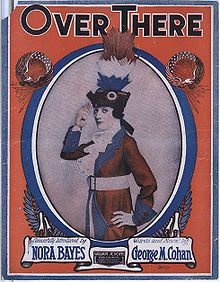Over There
| "Over There" | |
|---|---|
 1917 sheet music cover with Nora Bayes | |
| Song by Nora Bayes | |
| Written | April 7, 1917 |
| Published | June 1917 |
| Released | July 13, 1917 |
| Genre | War song, march music, Tin Pan Alley |
| Songwriter(s) | George M. Cohan |
"Over There" is a 1917 war song written by George M. Cohan that was popular with the United States military and the American public during World War I and World War II. Written shortly after the American entry into World War I, "Over There" is a patriotic propaganda song intended to galvanize American men to enlist in the American Expeditionary Forces and fight the Central Powers. The song is best remembered for a line in its chorus: "The Yanks are coming."[1]
History
[edit]According to the Library of Congress, Cohan wrote "Over There" during his commute to work on April 7, 1917,[2] a day after the U.S. officially abandoned their policy of non-interventionism and joined the Allied Powers. Its opening verse is derived from "Johnny, Get Your Gun", an 1886 song written by Monroe Rosenfeld, while its rhythm was based on a three-note bugle call.[3]
Cohan personally chose Nora Bayes to premiere "Over There" in June 1917,[4] with a Victor record released on July 13.[3] Though early tests with soldiers saw lukewarm reception, the song was very popular with the civilian public. President Woodrow Wilson described it as "a genuine inspiration to all American manhood". By the end of 1918, over 2 million copies of sheet music were sold.[3]
Though written and intended for World War I, the song has been revived on various occasions during and after World War II.[1] It was not heavily used during the Vietnam War, but it regained some popularity in the 21st century after the September 11 attacks and during the war on terror.[5]
Lyrics
[edit]

As sung by early 20th-century recording artist Billy Murray:
Verse 1
Johnny,[a] get your gun, get your gun, get your gun.
Take it on the run, on the run, on the run.
Hear them calling you and me,
Every Son of Liberty.
Hurry right away, no delay, go today.
Make your daddy glad to have had such a lad.
Tell your sweetheart not to pine,
To be proud her boy's in line.
Verse 2
Johnny, get your gun, get your gun, get your gun.
Johnny, show the Hun you're a son of a gun.
Hoist the flag and let her fly;
Yankee Doodle,[b] do or die.
Pack your little kit, show your grit, do your bit.
Yankee[c] to the ranks from the towns and the tanks.[d]
Make your mother proud of you
And the old red, white, and blue.[e]
Chorus
Over there, over there,
Send the word, send the word over there
That the Yanks are coming, the Yanks are coming,
The drums rum-tumming everywhere.
So prepare, say a prayer,
Send the word, send the word to beware –
We'll be over, we're coming over,
And we won't come back till it's over, over there.
In popular culture
[edit]- In 2009, the United States men's national soccer team used the chorus in a campaign during 2010 FIFA World Cup qualification matches.
- Since 2009, UK financial services comparison website Go.Compare has used an adapted version of the song for their adverts, sung by Wynne Evans.[7][8]
- The song provides the introduction to the Kanonenfieber song "The Yankee Division March" (with Trevor Strnad).[9]
See also
[edit]Notes
[edit]- ^ "Johnny" is a very common English given name and is used to address any anonymous man or men.
- ^ Also sung as "Like true heroes..."[6]
- ^ Also sung as "Soldiers..."[6]
- ^ Short for "tank town", meaning any town so small its primary purpose was to provide water for steam locomotives.
- ^ Also sung as "And to liberty be true."[6]
References
[edit]- ^ a b Mondello, Bob (December 20, 2018). "George M. Cohan, 'The Man Who Created Broadway,' Was An Anthem Machine". American Anthem. NPR. Retrieved April 29, 2022.
- ^ Whitfield, Sarah K. (2021). "'Over There' – Nora Bayes (1917)" (PDF). Library of Congress. Retrieved October 14, 2024.
- ^ a b c "Over There". Library of Congress. Retrieved June 29, 2023.
- ^ Rachel Martin (June 1, 2017). "'Over There' At 100". Morning Edition (Podcast). NPR. Retrieved October 14, 2024.
- ^ *Collins, Ace (2003). Songs Sung, Red, White, and Blue: The Stories Behind America's Best-Loved Patriotic Songs. HarperResource. pp. 138–145. ISBN 0060513047. Retrieved April 29, 2022 – via Internet Archive.
- ^ a b c Gottlieb, Robert; Kimball, Robert, eds. (2000). Reading Lyrics: More than a Thousand of the Finest Lyrics from 1900 to 1975. New York: Pantheon Books. p. 17. ISBN 9780375400810. Retrieved April 29, 2022 – via Google Books.
- ^ Ramsay, Fiona (August 18, 2009). "GoCompare creates opera singer to take on Comparethemarket's meerkat". campaign.co.uk. Retrieved January 18, 2024.
- ^ Price, Karen (July 26, 2015). "Go Compare: The most annoying man on telly is back". WalesOnline. Retrieved January 18, 2024.
- ^ Grütz, Moritz (July 26, 2015). "Passend zum EP-Titel startet der Quasi-Titeltrack "The Yankee Division March" mit dem in beiden Weltkriegen populären Song "Over There" (George M. Cohan), der vom Einmarsch der "Yanks" kündet". Metal 1. Retrieved January 18, 2024.
External links
[edit]- Nora Bayes recording July 13, 1917, via U.S. Library of Congress, National Jukebox
- Vintage Audio: Over There
- Rendition by Billy Murray and quartet
- Library of Congress essay on recording on the National Recording Registry.
- Sheet music for "Over There", Leo Feist, Inc., 1917.
- Over There from Patriotic Melodies

